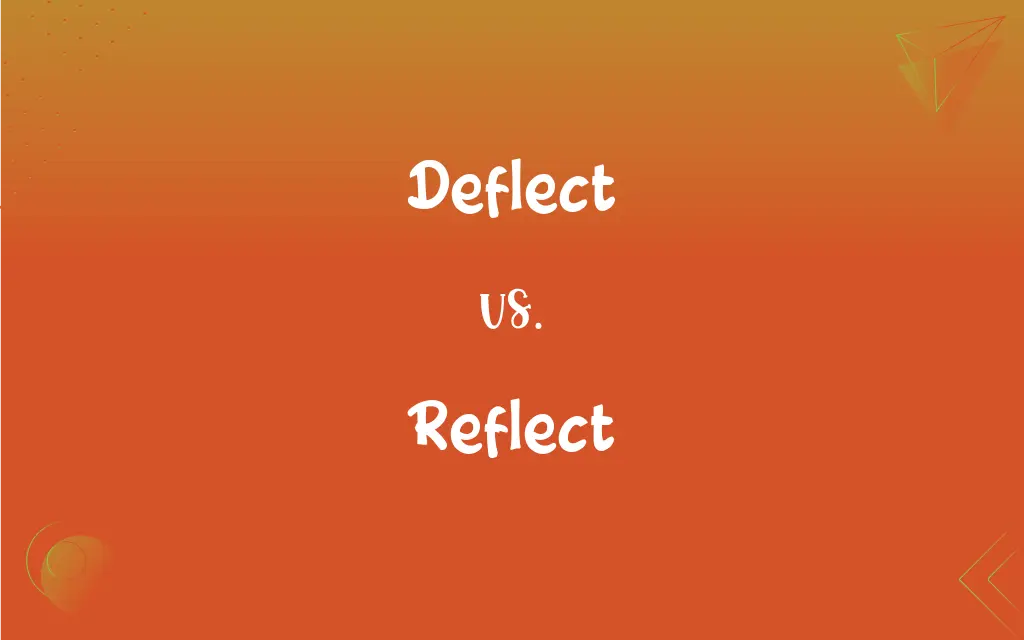Deflect vs. Reflect: What's the Difference?
Edited by Harlon Moss || By Janet White || Updated on September 27, 2023
Deflect is to cause something to change direction; reflect is to throw back without absorbing, as in light, heat, or sound.

Key Differences
Deflect and reflect, while seemingly similar, denote different actions involving the redirection of energy, matter, or attention. Deflect specifically refers to the action of causing something to change direction or course, usually by making it turn aside from a straight line. It often implies a deviation or turning away from an intended or expected path. Reflect, on the other hand, means to throw back light, heat, sound, or any form of energy without absorbing it. It is associated with the return of energy back to its source or another direction without being absorbed or transmitted through.
In physical terms, to deflect is to turn aside or cause to turn aside; bending or veering off in another direction is the essence of deflection. It can relate to tangible objects like arrows or intangible ones like criticism. Reflect involves the mirroring or throwing back of light waves or sound waves, for instance, a mirror reflects light, and a surface reflects sound, allowing us to see images or hear sounds. The reflection is not about a change in course but a bouncing back of energy or waves.
Deflect can be used in a figurative sense as well, where it implies avoiding answering a question by redirecting the conversation, or it could refer to changing the focus or direction of a discussion or attention. It implies a form of evasion or avoidance. Reflect, in a similar metaphorical sense, is used to denote serious thinking or contemplation, where one reflects on their thoughts, actions, or experiences. It symbolizes a form of consideration or pondering over something, allowing for a deeper understanding or realization.
The concept of deflection generally implies an alteration in the original trajectory or path, usually to avoid a collision or to evade something. Deflection might not give back anything to the source, rather it may just alter the direction or path. In contrast, reflection gives back; it returns light, sound, or other forms of energy to the originating source or in another direction. It doesn’t alter the entity but mirrors it, presenting it back in its original form or in a modified form due to the reflective surface.
In discussions or dialogues, to deflect a conversation means to subtly shift the topic or focus of the discussion, often to avoid addressing certain points or issues directly. It is a strategic move to control or manage the direction of the conversation. To reflect in dialogue means to think deeply or carefully about what has been said, to consider and contemplate the received information, opinions, or ideas, allowing for a thorough understanding and thoughtful response.
ADVERTISEMENT
Comparison Chart
Definition
To cause to change direction or course
To throw back without absorbing
Physical Interaction
Alters the original trajectory or path
Returns energy or waves back to the source or another direction
Figurative Sense
Implies avoidance or evasion by redirecting the focus or attention
Denotes contemplation or serious thinking about something
Result
Does not give back to the source, alters the direction or path
Gives back to the source, mirrors the entity
Application
Used to avoid direct confrontation or collision
Used to consider, contemplate, and give back
ADVERTISEMENT
Deflect and Reflect Definitions
Deflect
To cause something to veer off its path.
The shield can deflect incoming projectiles.
Reflect
To throw back light, heat, or sound without absorbing it.
The mirror reflects your image accurately.
Deflect
To redirect attention or focus away from oneself.
He tried to deflect the blame onto his colleagues.
Reflect
To think deeply or carefully about.
She took a moment to reflect on her achievements.
Deflect
To deviate or cause deviation from a designated route.
The car’s bumper can deflect minor impacts.
Reflect
To throw or bend back (light or sound, for example) from a surface.
Deflect
To turn aside from a straight course.
The goalie used his hands to deflect the ball.
Reflect
To give back or show an image of (an object); mirror.
Deflect
To turn aside or cause to turn aside; bend or deviate.
Reflect
To make apparent; express or manifest
Her work reflects intelligence.
Deflect
(transitive) To make (something) deviate from its original path.
Reflect
To bring as a consequence
The victory reflects credit on the coach.
Deflect
To touch the ball, often unwittingly, after a shot or a sharp pass, thereby making it unpredictable for the other players.
The defender deflected the cross into his own net.
Reflect
(Archaic) To bend back.
Deflect
(intransitive) To deviate from its original path.
Reflect
To be bent or thrown back
Her voice reflected off the canyon walls.
Deflect
To avoid addressing (questions, criticism, etc.).
The Prime Minister deflected some increasingly pointed questions by claiming he had an appointment.
Reflect
To give something back, as light or sound
A shiny surface that reflects well.
Deflect
To divert (attention, etc.).
Reflect
To give evidence of the characteristics or qualities of someone or something
That student's performance reflects well on the whole school.
Deflect
To cause to turn aside; to bend; as, rays of light are often deflected; to deflect a punch; to deflect criticism by acknowledging a mistake.
Sitting with their knees deflected under them.
Reflect
To bring blame or discredit
Hasty preparation of the report will reflect on you.
Deflect
To turn aside; to deviate from a right or a horizontal line, or from a proper position, course or direction; to swerve.
At some part of the Azores, the needle deflecteth not, but lieth in the true meridian.
To deflect from the line of truth and reason.
Reflect
To think seriously.
Deflect
Prevent the occurrence of; prevent from happening;
Let's avoid a confrontation
Head off a confrontation
Avert a strike
Reflect
To express carefully considered thoughts
In the essay, he reflects on his career.
Deflect
Turn from a straight course , fixed direction, or line of interest
Reflect
(transitive) To bend back (light, etc.) from a surface.
A mirror reflects the light that shines on it.
Deflect
Turn aside
Reflect
(intransitive) To be bent back (light, etc.) from a surface.
The moonlight reflected from the surface of water.
Deflect
Draw someone's attention away from something;
The thief distracted the bystanders
He deflected his competitors
Reflect
(transitive) To mirror, or show the image of something.
The shop window reflected his image as he walked past.
Deflect
Impede the movement of (an opponent or a ball);
Block an attack
Reflect
(intransitive) To be mirrored.
His image reflected from the shop window as he walked past.
Deflect
To avert or prevent something from a particular direction.
The barrier is designed to deflect the wind.
Reflect
(transitive) To agree with; to closely follow.
Entries in English dictionaries aim to reflect common usage.
Reflect
(transitive) To give evidence of someone's or something's character etc.
The team's victory reflects the Captain's abilities.
The teacher's ability reflects well on the school.
Reflect
(intransitive) To think seriously; to ponder or consider.
People do that sort of thing every day, without ever stopping to reflect on the consequences.
Reflect
To bend back; to give a backwa d turn to; to throw back; especially, to cause to return after striking upon any surface; as, a mirror reflects rays of light; polished metals reflect heat.
Let me mind the reader to reflect his eye on our quotations.
Bodies close together reflect their own color.
Reflect
To give back an image or likeness of; to mirror.
Nature is the glass reflecting God,As by the sea reflected is the sun.
Reflect
To throw back light, heat, or the like; to return rays or beams.
Reflect
To be sent back; to rebound as from a surface; to revert; to return.
Whose virtues will, I hope,Reflect on Rome, as Titan's rays on earth.
Reflect
To throw or turn back the thoughts upon anything; to contemplate. Specifically: To attend earnestly to what passes within the mind; to attend to the facts or phenomena of consciousness; to use attention or earnest thought; to meditate; especially, to think in relation to moral truth or rules.
We can not be said to reflect upon any external object, except so far as that object has been previously perceived, and its image become part and parcel of our intellectual furniture.
All men are concious of the operations of their own minds, at all times, while they are awake, but there few who reflect upon them, or make them objects of thought.
As I much reflected, much I mourned.
Reflect
To cast reproach; to cause censure or dishonor.
Errors of wives reflect on husbands still.
Neither do I reflect in the least upon the memory of his late majesty.
Reflect
Manifest or bring back;
This action reflects his true beliefs
Reflect
To throw or bend back or reflect (from a surface);
A mirror in the sun can reflect light into a person's eyes
Sound is reflected well in this auditorium
Reflect
Reflect deeply on a subject;
I mulled over the events of the afternoon
Philosophers have speculated on the question of God for thousands of years
The scientist must stop to observe and start to excogitate
Reflect
Be bright by reflecting or casting light;
Drive carefully--the wet road reflects
Reflect
Give evidence of a certain behavior;
His lack of interest in the project reflects badly on him
Reflect
Give evidence of the quality of;
The mess in his dorm room reflects on the student
Reflect
To give evidence of the characteristics or qualities of someone or something.
His actions reflect his good upbringing.
Reflect
To express or represent something else.
The company’s profits reflect its success.
Reflect
To embody or symbolize.
The law reflects the values of the society.
FAQs
Does deflecting always avoid a collision?
Not always, but deflecting often alters the path to avoid direct confrontation or collision.
Can deflect be used figuratively?
Yes, deflect can be used figuratively to imply avoidance or evasion by redirecting focus or attention.
Can reflect also mean to think deeply about something?
Yes, reflect can also mean to think deeply or carefully about something.
Can we reflect on our actions?
Absolutely, reflecting on one’s actions means to think deeply or carefully about them.
Can a deflection be unintentional?
Yes, a deflection can occur unintentionally due to various forces or impacts.
Does deflect mean to change direction?
Yes, to deflect means to cause something to change direction.
Does reflect mean to throw back without absorbing?
Yes, to reflect is to throw back light, heat, or sound without absorbing it.
Is reflection only about mirroring light or sound?
No, reflection can also imply considering or pondering over thoughts, actions, or experiences.
Can a surface both deflect and reflect light?
Yes, a surface can both deflect and reflect light depending on its properties and the angle of incidence.
Is deflection a strategic move in conversations?
Yes, deflection can be a strategic move to control or manage the direction of the conversation.
Does reflecting always involve giving back in the original form?
Not necessarily, the form might be modified due to the reflective surface’s properties.
Does deflecting imply altering the original entity?
Deflecting does not alter the original entity but changes its direction or path.
Is reflection a conscious process?
Reflection is typically a conscious and deliberate process of thinking or consideration.
Can deflect mean to deviate from a designated route?
Yes, to deflect can mean to deviate or cause deviation from a designated route.
Can reflection be symbolic?
Yes, reflection can be symbolic, representing or embodying something else.
About Author
Written by
Janet WhiteJanet White has been an esteemed writer and blogger for Difference Wiki. Holding a Master's degree in Science and Medical Journalism from the prestigious Boston University, she has consistently demonstrated her expertise and passion for her field. When she's not immersed in her work, Janet relishes her time exercising, delving into a good book, and cherishing moments with friends and family.
Edited by
Harlon MossHarlon is a seasoned quality moderator and accomplished content writer for Difference Wiki. An alumnus of the prestigious University of California, he earned his degree in Computer Science. Leveraging his academic background, Harlon brings a meticulous and informed perspective to his work, ensuring content accuracy and excellence.







































































